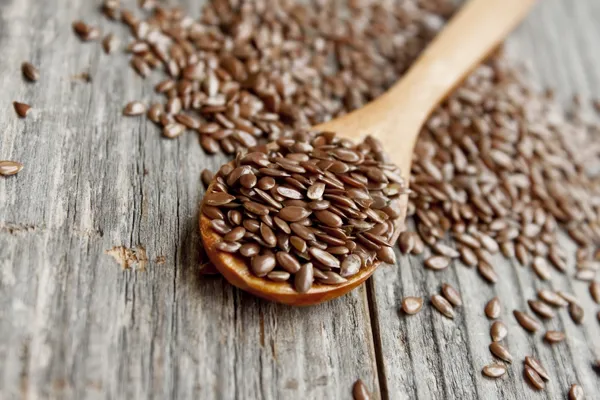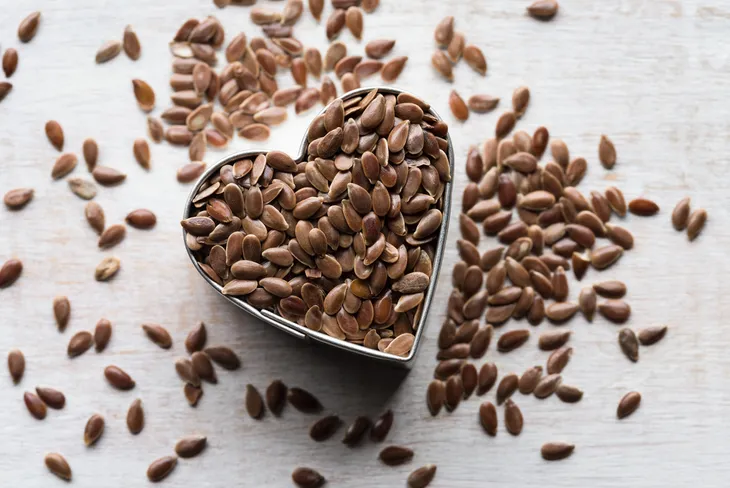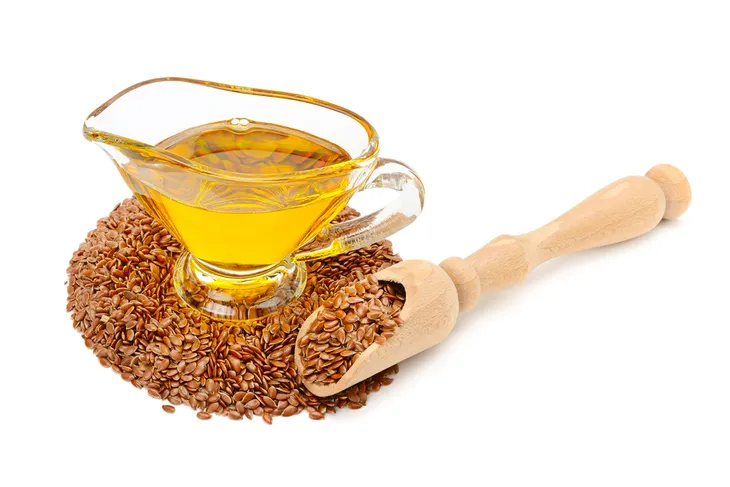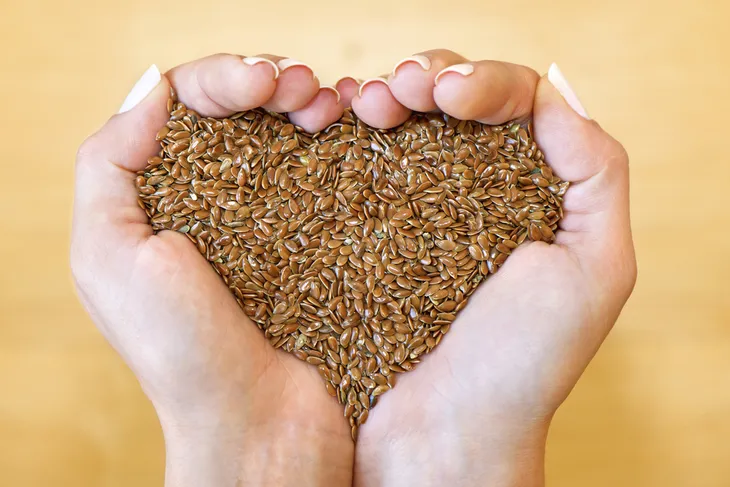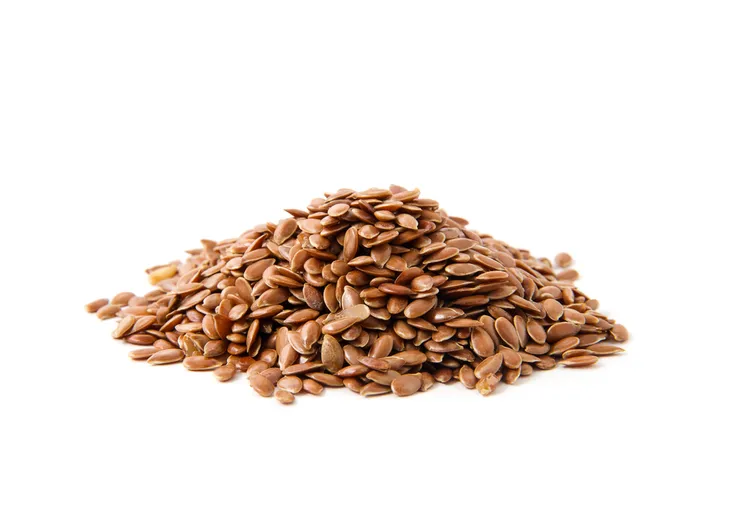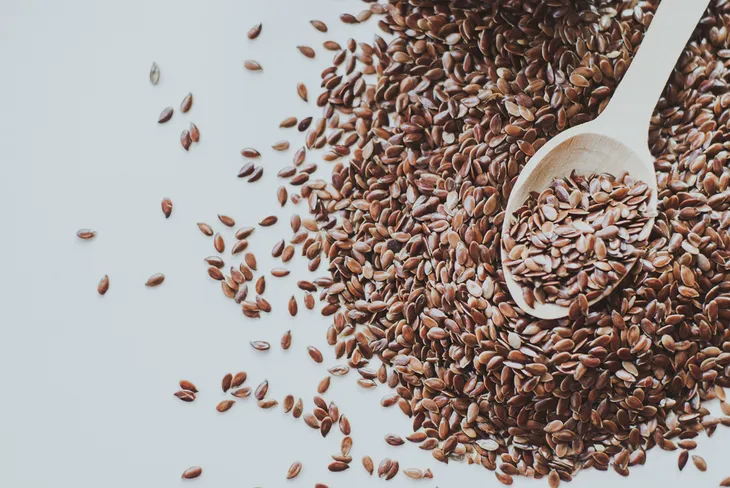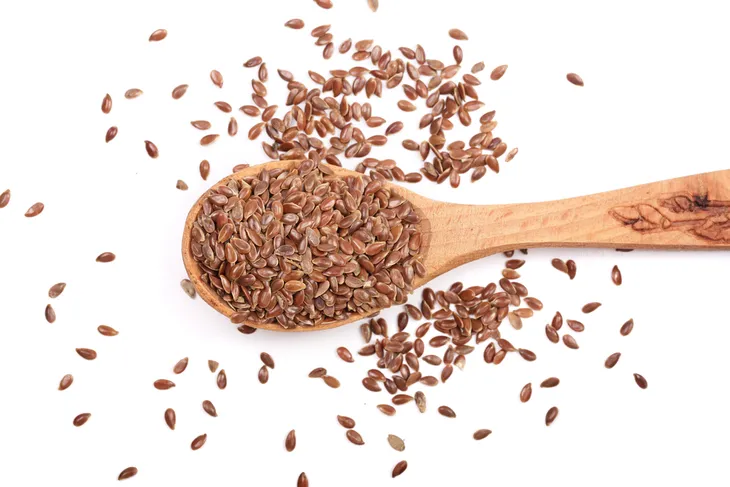The flaxseed: it’s one of the world’s oldest superfoods. Consumed by humans for roughly 6,000 years, the flaxseed has long established itself as a source of important vitamins and minerals. But it’s only in the last few decades that we’ve really come to grasp the true value of the flaxseed, which is often found in whole grain foods like bread and cereal but can also be obtained all on its own.
So, what, exactly, makes flaxseed a so-called “superfood”? Today, we understand that a big part of its value is related to the presence of omega-3 fatty acids, which have been shown to fight inflammation and help in the functioning of major organs. To learn more about these benefits and others, let’s take a closer look at the flaxseed.
Want diet & nutrition content delivered straight to your inbox? Sign up for our exclusive diet & nutrition newsletter!
Boost Digestion
Flaxseed is rich in mucilage gum content, a type of fiber that’s water soluble and, as a result, proceeds through the digestive system largely undigested. While that sounds problematic, it’s actually helpful in pushing food through the stomach into the intestines, from there it can be removed from the body. Not only that, but mucilage gum content can assist in preventing food from moving through the system too quickly, meaning the body has more time to absorb its nutrients.
Finally, the kind of fiber available in flaxseed remains intact in such a way that it often doesn’t result in the body absorbing many of its calories, so it can play a helpful role in weight loss. Generally speaking, fiber of this quality is hard to find in foods, which is why flaxseed has become so incredibly popular in recent years.
Cut Carbs
One of the more beneficial elements of flaxseed is that it’s low in carbohydrates but remains very high in both soluble and insoluble fiber. That makes it really quite unique, as most sources of fiber are high in carbohydrates.
In the end, this means flaxseeds can help with weight loss by efficiently moving food through the digestive system without compromising any effort to reduce caloric or carbohydrate consumption. Additionally, flaxseed can help with colon detoxification, which may also assist in the digestive process and with weight loss by helping us remove bodily waste and improve how we feel, physically.
Fight Inflammation and Heart Disease
The presence of omega-3 fatty acids in flaxseeds is what’s really intensified their popularity in recent years. It’s only been over the past decade or so that the benefits of omega-3s have become widely known, with a few different types of food gaining in popularity as a result. Other foods high in omega-3s include salmon, mackerel, tuna, eggs, and walnuts.
So, what’s the benefit of omega-3 fatty acids? For one, they have anti-inflammatory properties, which means they can help us fight infection and stay healthy. It can also help reduce the risk of coronary heart disease and hypertension, while improving the functionality of the heart. Finally, it’s been shown to help with some brain functionality, though this element requires further research.
Shiny Hair
This may not top your list of reasons to consume more flaxseeds, but for some people shiny, soft hair is incredibly important. And who dislikes being with someone that has nice hair? That’s right, absolutely no one.
How does this work? Flaxseeds contain both vitamin B and omega-3 fatty acids, which together can help moisten the hair, reducing dryness and helping protect it from the elements. For anyone who lives in a particularly dry or polluted place, such as a metropolitan area in the American Midwest, this could really help them acquire and maintain the kind of hair they can feel good about showing off.
Smooth, Supple Skin
Just as a diet high in flaxseeds can help you get softer, more shiny hair, it can also assist in making the skin smoother and more supple. And unlike the feel and look of our hair, the improvement of the skin’s structure has a demonstrable impact on our overall physical health.
So, how do flaxseeds help with our hair? Primarily, it’s related to the presence of omega-3 fatty acids and various types of vitamin B, which together can help prevent the skin from becoming dry and flaky. It may also help individuals with skin problems, from acne to eczema, reduce their symptoms. And it doesn’t take much to help: just a teaspoon of flaxseed oil once a day — or consuming foods containing actual flaxseeds — makes a world of difference.
Help with Hyperlipidemia
Hyperlipidemia is a condition that occurs when an individual’s blood contains excessive amounts of fat — to the point where it places a lot of pressure on the heart and can eventually result in the development of heart disease. In time, this could become life threatening if not treated properly.
Flaxseeds can help reduce one’s chances of developing hyperlipidemia and it can go a long way in helping individuals diagnosed with the condition. That’s because studies have shown that flaxseed oil can significantly reduce the amount of fat in the blood. All one needs to do is get roughly 30 grams of flaxseed powder (or the equivalent) every day. While that could be challenging, it may be possible to get the same results by simply consuming foods containing flaxseeds on a consistent basis.
Reduce Cholesterol Levels
You probably know someone who’s doing their best to reduce their cholesterol levels, as high cholesterol is a common problem in older adults, and especially men. The problem is that higher cholesterol levels place more pressure on the heart, intensifying existing heart problems or leading to heart disease.
Flaxseeds can help with this issue because they’ve been shown to help increase the amount of cholesterol that’s pushed out of the body through the bowels. In essence, rather than having cholesterol build up in the body, flaxseeds can see to the removal of it in larger quantities through your typical bowel movements.
Gluten-Free Benefits
Individuals with celiac disease, avoiding gluten is a must, as doing so could cause them to feel extreme pain and discomfort. Flaxseed can help in the replacement of grains that contain gluten. Unlike gluten, flax is able to absorb a lot of liquid and can help bind ingredients together, making it helpful in cooking and baking. One exceptional pairing in the kitchen is flaxseed and coconut flour, which together can help produce an excellent texture.
High In Antioxidants
Flaxseed is very high in antioxidants, specifically the type of antioxidant known as lignans. These lignans are able to provide the body with the ability to fight off free radicals, which can play an important role in the aging process and may assist in the development of infections and other health problems.
Getting more antioxidants in your diet is a great idea if you’re looking to detoxify from excessive drinking, smoking, eating too many processed foods, or generally leading a relatively unhealthy lifestyle. Other sources of antioxidants include seeds, beans, berries, and nuts, so try to increase the amount of these foods you add to your diet, too.
Better Digestion
It’s not often talked about in public, but a huge percentage of people regularly deal with really uncomfortable, even painful digestive problems that can make even the simplest activities difficult to complete. Some of these digestive issues include upset stomach, excessive gas, constipation, and diarrhea.
Flaxseeds can help alleviate some of these problems. That’s because the healthy fats available in flaxseeds can effectively reduce inflammation, which means flaxseeds can help maintain a healthy lining around the various tracts your food passes through once inside your body.
Prevent Cancer
It goes without saying that any food that helps in the prevention of cancer is worth adding to your diet. Flaxseeds qualify for this consideration, as they’ve been shown to help prevent a range of cancer types, from colon and ovarian cancer to breast and prostate cancer.
And all it takes to get these benefits: a single spoonful of flaxseeds each and every day. You could add some flaxseeds to your morning cereal, yogurt or cottage cheese, or you could try taking a spoonful of flaxseed oil. Of course, you might also try whole-grain bread that includes flaxseeds.
Fight Cancer
Consuming flaxseeds on a regular basis can play an important role in preventing cancer. But does it offer some help for those individuals who have already been diagnosed with cancer? The simple answer, it would appear, is yes.
For example, a recent study in the Journal of Clinical Cancer Research showed that a diet containing regular consumption of flaxseeds increased the chances of a breast cancer patient reducing tumor growth. Additionally, because flaxseeds contain a rare type of fiber known for helping improve digestive health, there is reason to believe regularly consuming flaxseeds could help in the fight against colon cancer and other types of cancer impacting the digestive system.


